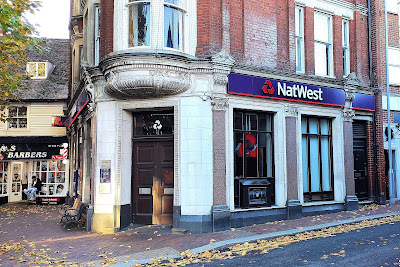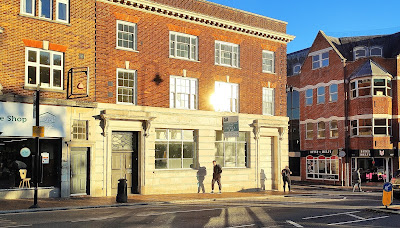Amidst all the talk of pubs closing and businesses failing, there’s one institution on the High Street that many commentators seem to have missed. The institution I’m talking about, is one which is so fundamental to the conduct of business and commerce, that it’s disappearance ought to be raising far more alarm bells than it actually has – or perhaps not? In case you hadn’t already guessed, the institution I am talking about is the High Street bank, once seen as the corner stone of most town centres, and regarded as unshakable, pillars of stability in a world that often seems to have gone completely mad. Times change though, and as we all know nothing stands still, no matter how much we would like them to As with pubs, banks are closing in their droves, and the reasons for this are purely monetary, as you might have guessed, and whilst to a certain extent. other financial institutions are also shutting up shop, the extent of this is far less than what we are currently witnessing from the major players in the game. These players are the big five banks that we’ve all grown up with and whose absence will certainly be noticed, and their presence sorely missed. They are of course, Barclays, HSBC (formerly the Midland,), Lloyds and National Westminster – Nat West, for short. In Tonbridge, we have already seen the closure of Barclays and Lloyds are due to shut up shop at the end of this month. Then, last week, the announcement came that Nat West too will be closing in the run-up to Christmas. So, the National Westminster Bank, with its imposing street corner position, ornate stonework, and sleek marble pillars, a real symbol of longevity, stability, and permanence, and an institution that has served the town of Tonbridge and its inhabitants for decades, will soon be just another empty building. When Eileen and I had our off-license business, it was that same branch of the Nat West that looked after all our banking needs and was the place where I made a beeline to on Monday and Friday mornings, to pay in the weekly and weekend takings. Because of this twice-weekly ritual, I got to know the counter staff, as we inevitably exchanged a few pleasantries. It is this loss of a facility, that provides an essential service for local businesses, that will have the most detrimental effect on the commercial life of the town, coming as it does, on the heels of the loss of Barclays and the imminent closure of Lloyds. A month or so ago, Mrs PBT’s enjoyed a meal and an evening out with some old friends. Their chosen destination was a fine old pub, in a rural location, and whilst settling up the bill at the bar afterwards, the landlady was bemoaning the loss of banking facilities in Tonbridge. She was telling the group that she now had to drive into Sevenoaks, a town renowned for its congestion and poor car parking facilities, in order to bank the weekly takings and procure sufficient change, rather than making the shorter and much more convenient journey into Tonbridge.
I’m not going to name the pub, although it is a well-known and well-regarded establishment which, like many local businesses is struggling to keep its head above water. The last thing that business owners in Tonbridge want is the extra hassle of being unable to pay in the takings locally, but their concerns are falling on increasingly deaf ears. Like its competitors, Nat West has blamed the closure of its Tonbridge branch, on a falloff in customer numbers compared to pre-pandemic levels, but many see this as just another excuse for what is clearly a cost-cutting exercise.
In common with other institutions, banks seem more concerned about their shareholders, than their customers, and whilst they would argue they are merely responding to customer demand by offering options for home banking, they have in effect, sowed the seeds of their own demise. Cynics would point out that the closure of walk-in High Street facilities, is a deliberate ploy to discourage the use of cash – an aim shared by both the banking system and the government, and whilst this judgement might well be correct, both institutions underestimate the important role that cash still plays in today’s world of business and commerce.I’m sure this trend is going to run, and run for some
time, but it isn’t one we can afford to ignore, especially when one considers
the negative effect it is having on cherished institutions like the local town
and village pub. It is also madness, for a town the size of Tonbridge to be left with just one bank, and even that could change, as who's to say HSBC won't shut up shop as well.







6 comments:
My old NatWest branch is now a licensed restaurant. For sixty years the town centre only had two pubs. Now there are six new licensed restaurants/cafes/ bars as well. All seem to be doing well. Strange times.
Coincidentally, last week I went in the new Cambridge Tap (actually a McMullens diner with keg) on the site of the central Cambridge Building Society I'd used for savings for 25 years till it closed recently. You wrote about it on this blog, which alerted me to a rare new Cambridge opening.
It's many years since I needed to actually go in an actual bank with everything on-line.
Strange times indeed, BillS. Incidentally, which town are you referring to?
Yes Martin, I did visit the Cambridge Tap, back in the spring, and thought it was pretty good - despite the absence of cask. The food offering, in particular, was excellent.
As for physical banks, I accept you can do most things on-line, but you can't pay in cash, pick up foreign currency or discuss matters such as investments or loans. I also prefer to use the ATM's that are situated inside banks or building societies. They are more secure - less likely to be "skimmed" and you are far less likely to be mugged. OK, not a common occurrence, but like many people, are feel safer using an internal machine, than one tucked way in a grubby shopping mall, where the local "yoof" are eying you up with suspicion!
I tend to visit a bank branch every couple of months or so, although generally in connection with voluntary organisations rather than my personal finances. Pretty much every time I go, there's a queue, which rather gives the lie to the banks' claim that people aren't using branches any more.
And very often customers are trying to resolve complex issues that would be difficult to do over the phone and impossible with a "chat bot".
Paul, it’s Huyton near Liverpool. In daytime, in the summer the new places were ticking over with as many people drinking lager as eating. A few weeks ago, on a Friday night they were all busy. I suppose people who used to go into Liverpool don’t trust the trains to get them back home. So here they have free parking and a cheaper taxi if they need it.
Thirty years ago, we had five banks and four building societies. Now just one of each.
BillS, glad to hear to hear there's been a positive, knock-on effect from all the disruption on the railways. Liverpool's loss, is Huyton's gain.
Incidentally, wasn't Huyton Harold Wilson's old parliamentary constituency, back in the day?
Post a Comment